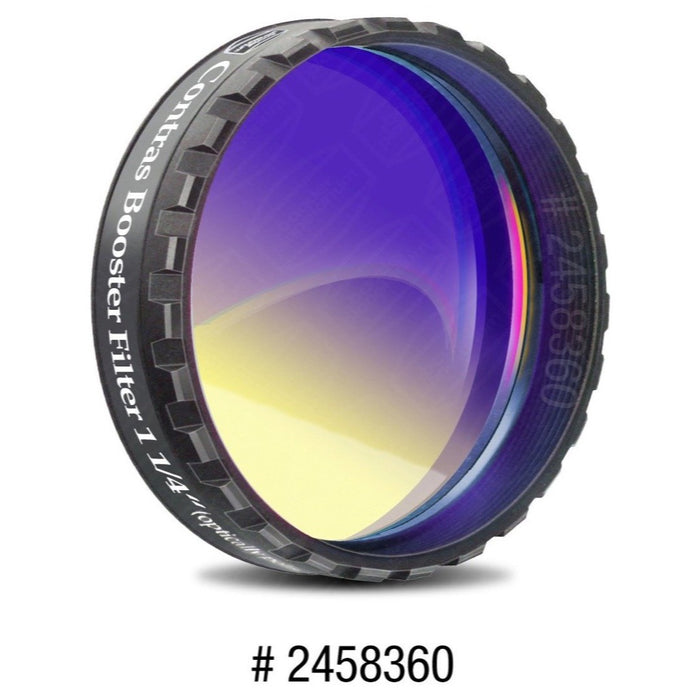
Baader Contrast-Booster Filter
Description
Free Shipping on most orders above $500*

Free Shipping on most orders above $500*
For Solar Observation use only in combination with Baader AstroSolar Safety Film!
Much more than a simple minus-violet filter. Based on the popular Baader Moon & Skyglow filter, the Baader Contrast-Booster takes contrast enhancement and skyglow reduction to the maximum level possible from a filter. Not only does this filter deliver a significant enhancement of planetary and lunar contrasts, but it is designed to also totally eliminate the damaging blue defocused haze present in achromatic refractors. Gone are the annoying blue halo and obscuring haze that surround and smear resolution and contrast. Subtle contrasts and colors are boosted, while displaying the full resolution your scope is capable of.
The Contrast-Booster combines a special proprietary melt of Neodymium glass with a carefully designed 23 layer dielectric long-pass blocker on one face, and a 7-layer ultra-low antireflection coating on the other face. By aggressively filtering out the defocused blue wavelengths, a light yellow tint is imparted to objects (noticeably less than a typical yellow filter). The special coatings enable over 95% transmission across key portions of the visible spectrum (including H-Alpha). This results in a filter that retains the colors and color contrasts in tough subjects like Jupiter, without excessive image dimming. Cloud bands retain their ruddy red hues, but now become more striking in contrast. The Great Red Spot finally becomes easier. Planets and Lunarscapes are set against a jet black sky. The Contrast-Booster is a must for Solar observing (with Baader Astro Solar).
As many users have found, this is a great filter for Mars! The views of Mars with all telescopes (including reflectors and apochromats) benefit from the RGB filtration plus blue blocking.
Combined with the Baader UV-IR-Cut Filter, the Contrast-Booster makes the ideal filter set for digital imaging. Rather than add the cost of additional IR filtration (only needed for digital imaging), the Baader Contrast Booster has been optimized for visual use. Digital imagers can simply add our Baader UV-IR-Cut Filter when needed. The true 1/4 wave fineoptically polished surfaces guarantee the sharpness and contrast of the image. Filters are available in both 1¼” and 2" sizes. The base substrate is a special custom melt of Neodymium doped glass, designed for specific transmission characteristics, and made only for Baader Planetarium. In addition to it's unique spectral characteristics, the Contrast-Booster offers Baader's hallmark optical and mechanical features that set it apart and result in the best possible image sharpness, contrast, and real-world durability;
"The contrast booster filter certainly removes the violet glow from my 6" f/8 refractor both on the bright stars and the moon. It does give a "warm" yellow tint to both. I soon got used to this when observing the moon and it posed no problem. I tried it on Mars. Unfortunately I am too far north(+53deg) to escape the worst effects of the earths atmosphere and seeing varied from fair to terrible. Still, it did make the dark markings more clearly visible. The quality of the glass is superb. Some other filters I have used cause a softening of the detail; not so with the Baader. All in all a very worthwhile addition to my observing tools; and at a great price too."Pat Abbott
"Just wanted to let you know that the Baader Contrast Booster Filter is a GREAT product. Far and away the single best filter that I have used on Mars. I'm looking forward to Jupiter and Saturn. It also really helped with my webcam imaging of Mars."Gordon Dayton
Transmission CurveTransmissionskurve The transmission line of Baader Contrast Booster
Transmissionskurve mit UV/IR Sperrfilter The transmission line of Baader Contrast Booster, combined with the UV/IR cut filter for CCD Astronomy
The transmission curve shows the light transmittance in percent versus the light wavelength in nanometres. Note the high transmission for visual observations of H-alpha (98%), H-beta (87%) and OIII (82%). In a light polluted town or city mercury and sodium vapour street lights emit at 435nm and between 570-590nm. Here the filter transmission is between 0.3 and 3%. Together with the Baader UV / IR cut filter Baader Contrast Booster is additionally an optimal filter for CCD images from light-polluted big city and metropolitan area (see second filter curve).
Specifications
| MANUFACTURER | Baader Planetarium |
|---|---|
| SKU (#) | 2458360 |
| EAN CODE | 4047825009517 |
| WEIGHT (KG) | 0.059 |
| TRANSMISSION RANGE | multiple bands (see spectral image) |
| FILTER THICKNESS (WITHOUT CELL) | 1 mm |
| AR-COATING | Phantom Coating® Group, planeoptically polished |
| FILTER SIZE | 1 25 inch |
| FILTER USAGE | Contrast Enhancement, Color Correction, IR-Cut, Planetary |
| FILTER MOUNTED | Mounted (LPFC 6mm) |
| TYPE OF FILTER | Bandpass |
| SINGLE OR SET? | Single Filter |
| FILTER SHAPE | round |
| MANUFACTURER | Baader Planetarium |
|---|---|
| SKU (#) | 2458365 |
| EAN CODE | 4047825009500 |
| WEIGHT (KG) | 0.067 |
| TRANSMISSION RANGE | multiple bands (see spectral image) |
| FILTER THICKNESS (WITHOUT CELL) | 1 mm |
| AR-COATING | Phantom Coating® Group, planeoptically polished |
| FILTER SIZE | 2 inch |
| FILTER USAGE | Contrast Enhancement, Color Correction, IR-Cut, Planetary |
| FILTER MOUNTED | Mounted (LPFC 6mm) |
| TYPE OF FILTER | Bandpass |
| SINGLE OR SET? | Single Filter |
| FILTER SHAPE | round |
FAQ - Problems with filters can have the strangest causes
Testreview - Baader Anti-Fringing Filters - Astronomy Technology Today